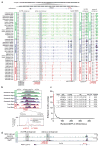Parkinson-associated risk variant in distal enhancer of α-synuclein modulates target gene expression
- PMID: 27096366
- PMCID: PMC5042324
- DOI: 10.1038/nature17939
Parkinson-associated risk variant in distal enhancer of α-synuclein modulates target gene expression
Abstract
Genome-wide association studies (GWAS) have identified numerous genetic variants associated with complex diseases, but mechanistic insights are impeded by a lack of understanding of how specific risk variants functionally contribute to the underlying pathogenesis. It has been proposed that cis-acting effects of non-coding risk variants on gene expression are a major factor for phenotypic variation of complex traits and disease susceptibility. Recent genome-scale epigenetic studies have highlighted the enrichment of GWAS-identified variants in regulatory DNA elements of disease-relevant cell types. Furthermore, single nucleotide polymorphism (SNP)-specific changes in transcription factor binding are correlated with heritable alterations in chromatin state and considered a major mediator of sequence-dependent regulation of gene expression. Here we describe a novel strategy to functionally dissect the cis-acting effect of genetic risk variants in regulatory elements on gene expression by combining genome-wide epigenetic information with clustered regularly-interspaced short palindromic repeats (CRISPR)/Cas9 genome editing in human pluripotent stem cells. By generating a genetically precisely controlled experimental system, we identify a common Parkinson's disease associated risk variant in a non-coding distal enhancer element that regulates the expression of α-synuclein (SNCA), a key gene implicated in the pathogenesis of Parkinson's disease. Our data suggest that the transcriptional deregulation of SNCA is associated with sequence-dependent binding of the brain-specific transcription factors EMX2 and NKX6-1. This work establishes an experimental paradigm to functionally connect genetic variation with disease-relevant phenotypes.
Figures














Comment in
-
Parkinson's disease: Guilt by genetic association.Nature. 2016 May 5;533(7601):40-1. doi: 10.1038/nature17891. Epub 2016 Apr 20. Nature. 2016. PMID: 27096361 No abstract available.
-
SNPing SCNA regulatory elements gives a CRISPR view of genetic susceptibility in Parkinson's disease.Mov Disord. 2016 Oct;31(10):1479. doi: 10.1002/mds.26747. Mov Disord. 2016. PMID: 27501414 No abstract available.
References
-
- McClellan J, King MC. Genetic Heterogeneity in Human Disease. Cell. 2010;141:210–217. - PubMed
Publication types
MeSH terms
Substances
Grants and funding
LinkOut - more resources
Full Text Sources
Other Literature Sources
Medical
Molecular Biology Databases
Research Materials
Miscellaneous

